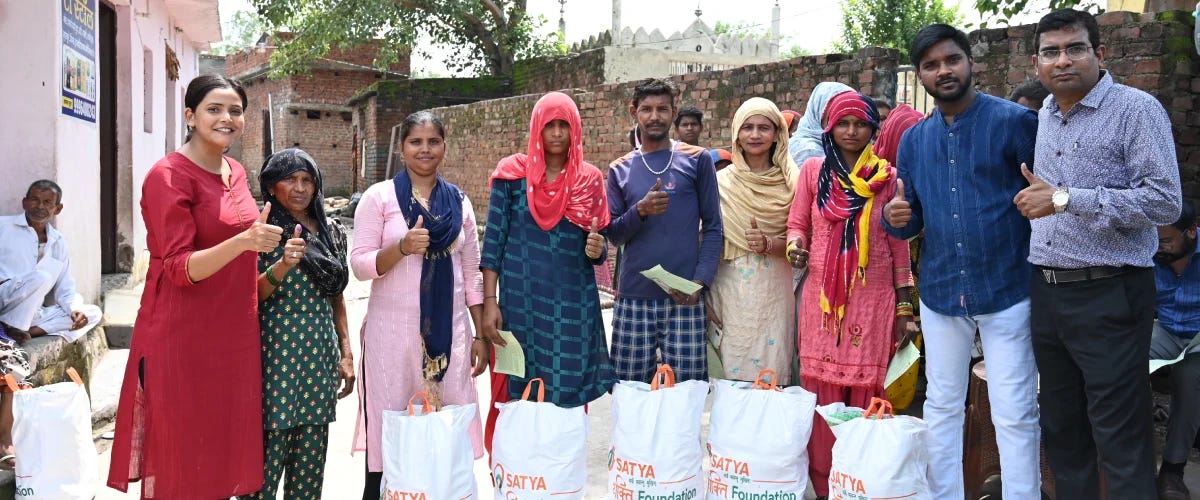How can I choose Best NPO Working in India?

Non-Profit Organizations (NPOs) serve a vital purpose in tackling social, economic and environmental challenges. With thousands of NPO working in India, selecting the appropriate one to support (or work with) can be daunting. Here’s a comprehensive guide: it aims to assist you in making an informed decision. Although many NPOs share similar goals, their methods and impacts can differ significantly. This variability is crucial to consider because it affects the effectiveness of your support or involvement.
1. Define Your Cause
Prior to embarking on your search, it is essential to ascertain the cause or issue that resonates most profoundly with you. Nonprofit organizations NPO working in India operate within a multitude of sectors, including education, health, environmental sustainability, women’s empowerment, child welfare and rural development. By pinpointing your specific area of interest, and facilitate a connection with an organization that embodies your values.
Furthermore, it is prudent to investigate the organization’s mission and vision. Reviewing the mission and vision statements of the NPO is critical. Seek out NPOs whose objectives align closely with your personal beliefs and expectations, because a clear and compelling mission often serves as an indicator of a well-structured organization. However, do not overlook the importance of understanding the nuances within these statements; they can reveal much about the organization’s operational ethos.
3. Check Credibility and Legal Compliance
It is essential to ensure that the NPO is registered under the pertinent Indian laws (for instance, the Societies Registration Act, the Indian Trust Act, or Section 8 of the Companies Act). You should also check if they possess certifications such as 80G and 12A, which not only confer tax benefits to donors, but also signify transparency. Platforms like GuideStar India and the Niti Aayog NGO Darpan portal can assist you in verifying the legitimacy of an organization; however, it is crucial to approach this process carefully. Although these resources are helpful, one must remain vigilant in their assessment (because not all organizations uphold the same standards).
4. Evaluate Transparency and Accountability
Transparency serves as a hallmark of a credible nonprofit organization (NPO). It is essential to seek out organizations that publish annual reports — these documents should detail their activities as well as their financial statements. Although annual reports are vital, they are not the only indicator of an NPO’s integrity. This means that a comprehensive evaluation is necessary because transparency encompasses more than just published documents.
Clearly state how funds are utilized.
They are candid regarding their team structure (and governance). Transparency is crucial because it ensures that your contributions (1) are truly making a significant impact. However, some may argue that open communication can lead to challenges; this is often the case in complex organizations. Although transparency is generally beneficial, it can sometimes create unintended consequences.
5. Explore Collaboration Opportunities
If you are contemplating (1) the idea of volunteering or collaborating with a non-profit organization (NPO), it is essential to evaluate their readiness to engage in partnership. Organizations that prioritize collaboration and community participation tend to be more inclusive and dynamic. However, this willingness may vary; some may be more open (2) than others. Although many NPOs understand the importance of partnerships, not all embrace them wholeheartedly. Because of this, it is crucial to conduct a thorough assessment before committing your time and resources.
6. Speak to Beneficiaries and Stakeholders
Engaging with individuals who have gained from the NPO’s programs is essential (1). Their experiences may provide a ground-level perspective on the organization’s impact. You can also reach out to current or former volunteers and employees for feedback; however, consider that their insights might differ. Although valuable, this feedback can be subjective because it is shaped by personal experiences. Thus, it’s important to gather a range of opinions to fully understand the NPO’s effectiveness.
7. Consider Location and Accessibility
Although some non-profit organizations (NPOs) operate on a national scale, others concentrate on particular regions or communities. This choice — selecting an organization close to your area or one where you aspire to make an impact — can significantly enhance your engagement and comprehension of their efforts. However, understanding local dynamics is crucial because it shapes the effectiveness of your contributions.
NPO in India: Making a Real Difference
Non-Profit Organizations (NPOs) play a vital role in confronting the socio-economic challenges that India encounters. With a population exceeding 1.4 billion and remarkable diversity, India faces a multitude of issues: poverty, educational inequalities, environmental concerns and health crises. In this context, NPOs act as essential agents of change, filling gaps that government initiatives often neglect. These organizations is substantial and they are genuinely transforming people’s lives. Although obstacles persist, their effort is contributing significantly to societal progress.

1. Education and Skill Development
India’s literacy rate has experienced consistent growth; however, disparities continue to exist, particularly in rural and marginalized communities. NPOs (non-profit organizations) like Pratham and Teach For India have stepped in to make sure quality education is accessible. These organizations focus on delivering fundamental literacy and numeracy skills (as well as) training educators to elevate educational standards. They also facilitate vocational and skill development programs for the youth. Because of their initiatives, millions of children and adults are being equipped with the essential tools to break free from the cycle of poverty. This progress is vital, although obstacles still persist.
2. Healthcare Access and Awareness
Healthcare remains a notable issue, especially in regions that are underserved. Non-profit organizations (NPOs) such as Goonj and Smile Foundation work tirelessly to tackle this: they offer vital support and resources. However, the challenges continue. Although these organizations exert considerable efforts, their influence can be restricted because of numerous systemic obstacles. This situation highlights the necessity of ongoing commitment and innovation in healthcare delivery. Ultimately, progress is critical, but it demands cooperation and dedication from every sector involved.
Set up health camps and mobile clinics.
Elevating consciousness about hygiene, nutrition and preventive care is imperative. Surgical procedures and medical treatments should be facilitated for individuals who are underprivileged. Their initiatives not only save lives; however, they also cultivate a healthier and more informed society. Although challenges are present, these endeavors remain vital because they enhance overall well-being.
3. Women’s Empowerment
Gender inequality remains a prominent concern across numerous regions in India; thus, the empowerment of women is an essential focal point. These organizations like SEWA is actively involving in delivering micro-loans. However, they also provide legal assistance and support to victims of domestic violence. In addition, these organizations promote girls’ education and leadership opportunities. These initiatives have, in fact, allowed many women to achieve financial independence and assert their rights, although obstacles continue to persist. Because of this, the endeavors of these organizations are crucial for instigating change.
4. Environmental Conservation
As the climate crisis looms (a pressing issue), Indian non-profit organizations (NPO) are increasingly prioritizing sustainability and environmental protection. Groups such as CSE and WWF India are engaged in promoting renewable energy and sustainable practices; however, the challenges remain significant. This commitment is crucial, because it addresses urgent ecological concerns. Although progress has been made, it is essential to continue these efforts to ensure a sustainable future.
Conserving wildlife and natural habitats.
Participating in campaigns designed to reduce plastic waste and pollution is vital; (their) endeavors significantly contribute to ensuring a more sustainable future for generations to come. However, the challenge persists as quite daunting. Although strides have been made, additional efforts are necessary because the repercussions of inaction are severe. This is essential for environmental well-being, as it directly affects the planet we will leave for others.
5. Disaster Relief and Rehabilitation
India’s geographic diversity makes it vulnerable to natural disasters (such as floods, cyclones and earthquakes). NPOs (non-profit organizations) like Akshaya Patra and CARE India are often the first responders, providing aid; however, the magnitude of these disasters can frequently surpass their capacities. This presents significant challenges, because although these organizations strive tirelessly, they encounter various barriers in accessing the communities in need. Thus, the demand for additional resources and support is essential.
Work with policymakers to frame better laws.
Engaging in research and disseminating reports serves to underscore urgent issues: (this) mobilizes public sentiment via diverse campaigns and outreach initiatives. Their advocacy ensures that marginalized voices are acknowledged at both national and global levels. However, the challenge remains considerable, because many voices continue to go unheard. Although efforts are in progress, the impact may be inconsistent.

Comments
Post a Comment